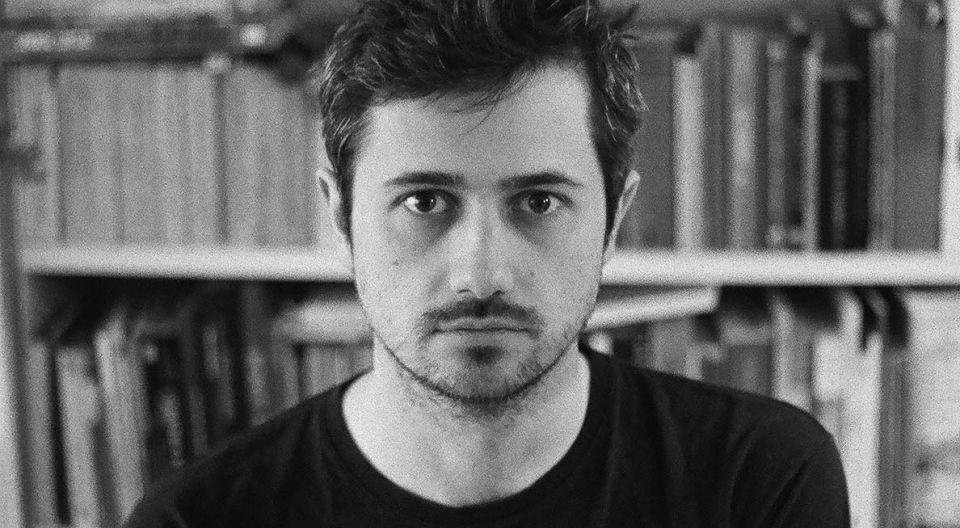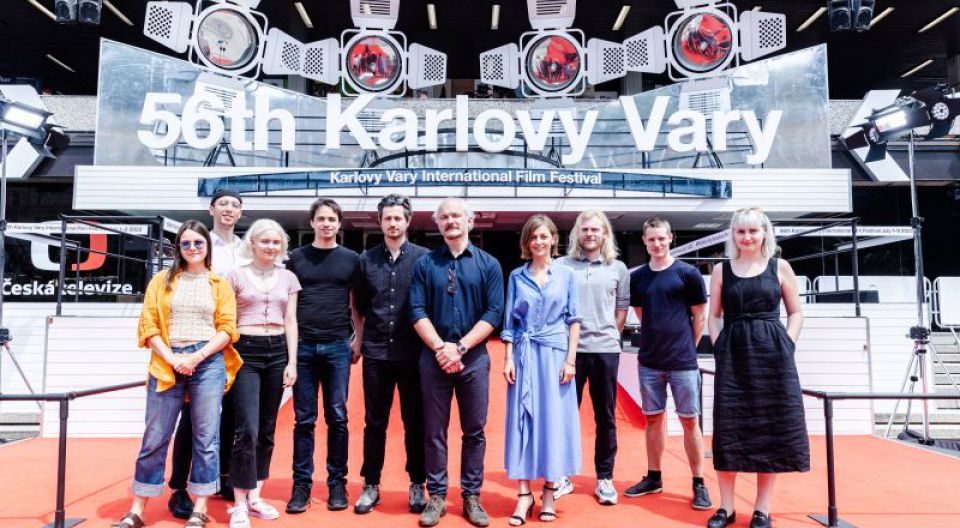13.
07.
2022.
Department
Direction
Direction
Interview with Maciej Jankowski, our graduate and director of the film FRUITS AND VEGETABLES, which was presented in the Future Frames section at Generation NEXT of European Cinema IFF Karlovy Vary.
About festival experiences, film work and shame ...
We know that in Karlovy Vary, your film was screened for the public, media and industry, you took part in the pitching session and in the master class with the American director Tim Sutton. Tell us what really happened there.
Maciej: We were taken care of by the Future Frames programme. Thanks to this initiative, European directors have access to professionals who, from now on, will look after and promote our films in a certain way. They make it possible for us to find a producer or co-producer for a new project, or to find people who would like to participate in a project as early as at the script stage. On the other hand, it was just an amazingly enjoyable time spent with other directors who were showing their films. We had the opportunity to find out how the film works at a large festival, how the audience reacts to it, or to discuss our work with other filmmakers. It was an opportunity for honest conversation and getting to know each other. We also had a meeting with the festival programmers. We were able to ask them what films they are interested in, what they take into consideration during the film selection, and what made them interested in my film as well.
Your film - " Fruits and Vegetables " - is a short story about an obese boy, Wojtek, for whom the desire to change his appearance is a very serious matter. A teenager's drama unfolding, but still served on a colourful and light plate. It is also your fiction master's degree film. Tell us how the idea for the film came about and how you feel about it.
Maciej: I think that in the first year of my studies, I was already thinking about presenting the world that concerns me in a film, which I knew from my childhood. My parents owned a grocery store and I didn't like the place. I saw how this work affected them. I also had a problem with how my peers perceived me, and maybe most of all with how I perceived myself. These elements formed the basis of my story. However, I did not know yet how to progress with this. I tried to look at what such a teenager could do with his shame: who he would blame for it, how would he would try to solve the problem. This is my personal story and I tried to work on it several times, but it was only in my last year at the School that I managed to find a beginning, middle and end for it. I like this film very much. I thought it was closer to the documentary filmmaking, but thanks to it I believed that working on fiction films could also be nice and that it could be a good move for me. I also have great memories of the preparation process and working with a great crew and exceptional actors. I spent a lot of time with talented people who have really dedicated themselves to this project and we developed a close relationship. I am glad that the audience likes our film and that it visits various festivals.
I also liked this film from the first time I watched it and I have the impression that it reaches everyone. It was presented in the Czech Republic, at the mentioned festival in Karlovy Vary, and was shortlisted by the Yugo Bafta Student Award. It was also shown in Poland: at the Warsaw Film Festival and at the Film Debuts Festival "Młodzi i Film" in Koszalin. Conclusion? A story rooted in Polish reality that appeals to viewers all over the world. Where did you find "universal character" in this story?
Maciej: Of course, it's not that everyone likes the story. I have also encountered critical opinions. Some appreciate it more than others. It's not a bad situation. Anyway, it seems to me that the story works best in the aspect of presenting the personal experiences we all have with parents. Such moments that make us embarrassed, we don't know what to do, we feel ashamed and we feel strange in front of other people. I think this is universal.
Thank you for adding this other perspective, which shows how cinema works in a variety of ways. Please tell us what your plans for the nearest future are or what you are working on now.
Maciej: For me, this is a very difficult and strange moment in my life. , Unfortunately, I can't say it's great that I finished School and I have three ready-made screenplays in a drawer. I'm working on finding a screenplay or screenwriter to collaborate with. I feel that I need it. I would like to take advantage of the fact that different people are already getting in touch and asking about future projects. I think this is the time to find the next story as soon as possible and fight to turn it into a film.
So we keep our fingers crossed for you to find it and make your plans come true. Thank you for talking to me.
Interviewer: Małgorzata Lisiecka-Muniak from the Promotion Office of the Lodz Film School.
Photo 2 - www.efp-online.com/Future_Frames
We know that in Karlovy Vary, your film was screened for the public, media and industry, you took part in the pitching session and in the master class with the American director Tim Sutton. Tell us what really happened there.
Maciej: We were taken care of by the Future Frames programme. Thanks to this initiative, European directors have access to professionals who, from now on, will look after and promote our films in a certain way. They make it possible for us to find a producer or co-producer for a new project, or to find people who would like to participate in a project as early as at the script stage. On the other hand, it was just an amazingly enjoyable time spent with other directors who were showing their films. We had the opportunity to find out how the film works at a large festival, how the audience reacts to it, or to discuss our work with other filmmakers. It was an opportunity for honest conversation and getting to know each other. We also had a meeting with the festival programmers. We were able to ask them what films they are interested in, what they take into consideration during the film selection, and what made them interested in my film as well.
Your film - " Fruits and Vegetables " - is a short story about an obese boy, Wojtek, for whom the desire to change his appearance is a very serious matter. A teenager's drama unfolding, but still served on a colourful and light plate. It is also your fiction master's degree film. Tell us how the idea for the film came about and how you feel about it.
Maciej: I think that in the first year of my studies, I was already thinking about presenting the world that concerns me in a film, which I knew from my childhood. My parents owned a grocery store and I didn't like the place. I saw how this work affected them. I also had a problem with how my peers perceived me, and maybe most of all with how I perceived myself. These elements formed the basis of my story. However, I did not know yet how to progress with this. I tried to look at what such a teenager could do with his shame: who he would blame for it, how would he would try to solve the problem. This is my personal story and I tried to work on it several times, but it was only in my last year at the School that I managed to find a beginning, middle and end for it. I like this film very much. I thought it was closer to the documentary filmmaking, but thanks to it I believed that working on fiction films could also be nice and that it could be a good move for me. I also have great memories of the preparation process and working with a great crew and exceptional actors. I spent a lot of time with talented people who have really dedicated themselves to this project and we developed a close relationship. I am glad that the audience likes our film and that it visits various festivals.
I also liked this film from the first time I watched it and I have the impression that it reaches everyone. It was presented in the Czech Republic, at the mentioned festival in Karlovy Vary, and was shortlisted by the Yugo Bafta Student Award. It was also shown in Poland: at the Warsaw Film Festival and at the Film Debuts Festival "Młodzi i Film" in Koszalin. Conclusion? A story rooted in Polish reality that appeals to viewers all over the world. Where did you find "universal character" in this story?
Maciej: Of course, it's not that everyone likes the story. I have also encountered critical opinions. Some appreciate it more than others. It's not a bad situation. Anyway, it seems to me that the story works best in the aspect of presenting the personal experiences we all have with parents. Such moments that make us embarrassed, we don't know what to do, we feel ashamed and we feel strange in front of other people. I think this is universal.
Thank you for adding this other perspective, which shows how cinema works in a variety of ways. Please tell us what your plans for the nearest future are or what you are working on now.
Maciej: For me, this is a very difficult and strange moment in my life. , Unfortunately, I can't say it's great that I finished School and I have three ready-made screenplays in a drawer. I'm working on finding a screenplay or screenwriter to collaborate with. I feel that I need it. I would like to take advantage of the fact that different people are already getting in touch and asking about future projects. I think this is the time to find the next story as soon as possible and fight to turn it into a film.
So we keep our fingers crossed for you to find it and make your plans come true. Thank you for talking to me.
Interviewer: Małgorzata Lisiecka-Muniak from the Promotion Office of the Lodz Film School.
Photo 2 - www.efp-online.com/Future_Frames

